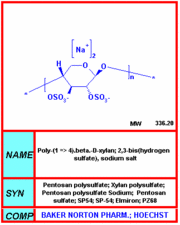Selecting a treatment for interstitial cystitis is a challenge. In a recent study of 581 women with the disorder, a total of 183 different treatments were prescribed (Urology 56[6]:940-45 , 2000). Ninety of the treatments were prescribed for one patient each, and even the most widely prescribed treatment, amitriptyline, was used in fewer than 17% of the patients.
Medication choices are often made based on whether the patient's primary symptom is pain or urinary frequency and/or urgency.
Experts emphasize the importance of an accurate diagnosis. Among women, who account for about 90% of cases, symptoms of interstitial cystitis can be mistaken for endometriosis, recurrent bladder infection, vulvovaginitis, or vestibulitis.
The patient's history is key Patients with interstitial cystitis often report pain that is aggravated by a full bladder and is at least partially alleviated by voiding. Patients can also have urinary urgency, frequency and nocturia. Pain can also occur during or after sexual intercourse. One recent study found that 85% of women with the pain symptoms described above and a history of voiding more than seven times a day had interstitial cystitis, a diagnosis that was nailed down by the patients' hypersensitivity to potassium injected into the bladder.
The patient should have no other clinical conditions that can explain the symptoms, such as a history of radiation to the bladder, urinary tract infection, bladder stones, or cystitis due to tuberculosis or chemotherapeutic agents. Urinalysis should be done to rule out infection or hematuria associated with bladder cancer. The physical examination may be unremarkable, except for possible pelvic or lower abdominal pain, and, in women, tenderness upon vaginal examination.
For reasons that are as yet unexplained, interstitial cystitis symptoms tend to improve in some patients during early pregnancy Experts generally do not prescribe medications to patients during this time, relying on nonpharmacologic remedies that may provide relief to nonpregnant patients as well. These include avoidance of caffeine, tomatoes, vinegar, and a variety of fruits that can aggravate the urinary tract, such as cantaloupe.
Properly performed Kegel exercises are recommended by some experts, but others believe that tightening the pelvic floor muscles only exacerbates muscle spasms in some patients. These patients may benefit more from biofeedback or muscle relaxants.
Physicians may want to inform patients of the Interstitial Cystitis Association (800-HELP-ICA; www.ichelp.org), which provides education and research funding.
COPYRIGHT 2001 International Medical News Group
COPYRIGHT 2002 Gale Group



